<Back to Index>
- King of the Hellenes George II, 1890
- King of the Hellenes Paul, 1901
- Queen Consort of the Hellenes Frederica of Hanover, 1917
PAGE SPONSOR
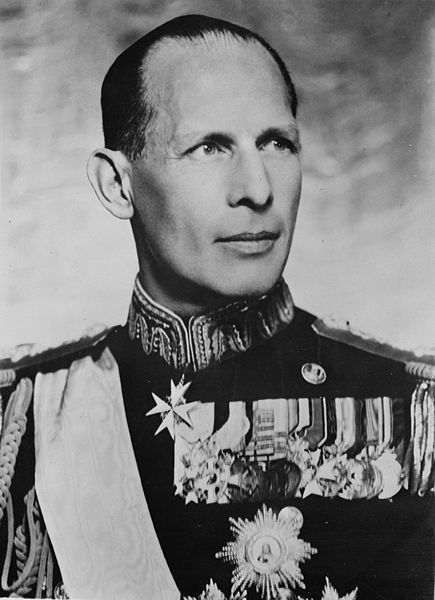
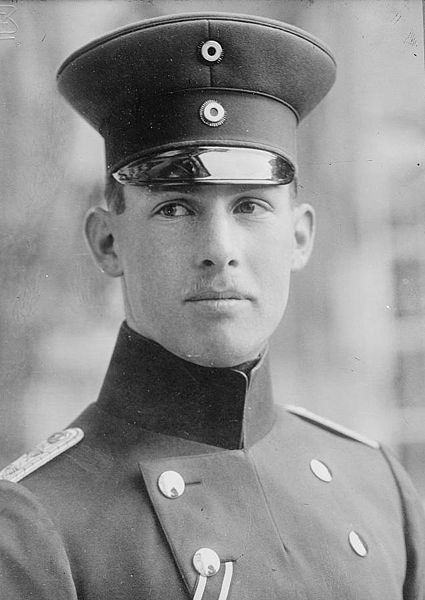
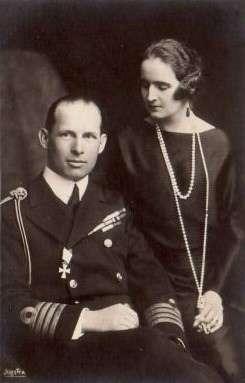
George II (Greek: Γεώργιος Βʹ, Βασιλεὺς τῶν Ἑλλήνων; 20 July 1890 – 1 April 1947) reigned as King of Greece from 1922 to 1924 and from 1935 to 1947.
George was born at the royal villa at Tatoi, near Athens, the eldest son of King Constantine I of Greece and his wife, Princess Sophia of Prussia. George pursued a military career, training with the Prussian Guard at the age of 18, then serving in the Balkan War as a member of the 1st Greek Infantry. When his grandfather was assassinated in 1913, George became the crown prince (Diadochos (Heir)) as well as the Duke of Sparta.
After a coup deposed King Constantine during the First World War, Crown Prince George, by then a Major, followed his father into exile in 1917 (National Schism); his brother Alexander was installed as king by prime minister Eleftherios Venizelos, an avowed Republican.
When Alexander I died following an infection from a monkey bite in 1920, Venezelos was voted out of office, and a plebiscite restored Constantine to the throne. Crown Prince George served as a colonel, and later a major general in the war against Turkey. During this time he married his second cousin, on 27 February 1921 in Bucharest, Princess Elisabeth of Romania, daughter of King Ferdinand and Queen Marie of Romania. When the Turks defeated Greece at the Battle of Dumlupınar, the military forced the abdication of Constantine, and George succeeded to the Greek throne on 27 September 1922.
Following a failed royalist coup in October 1923, the Revolutionary Committee "asked" him to depart Greece while the National Assembly considered the question of the future form of government. He complied and, although he refused to abdicate, he left on 19 December 1923 for exile in his wife's home nation of Romania. When a republic was proclaimed on 25 March 1924, he was officially deposed, stripped of his Greek nationality and his property confiscated.
His wife stayed in Bucharest whilst he spent more and more time abroad visiting Britain, and his mother in Florence. In 1932 he left Romania permanently and moved to Britain. Elisabeth and he had no children, and were divorced on 6 July 1935.
In Greece between 1924 and 1935 there were 23 changes of government, a dictatorship and 13 coups. General Georgios Kondylis, a former Venizelist, overthrew the government in October 1935 and appointed himself Prime Minister. He then arranged a plebiscite both to approve his government and to bring an end to the Republic. On 3 November 1935, almost 98% of the reported votes supported restoration of the monarchy. The balloting was not secret, and participation was compulsory. As Time described it at the time, "A voter could drop into the ballot box a blue vote for George II and please General George Kondylis... or one could cast a red ballot for the Republic and get roughed up."
George, who had been living at Brown's Hotel in London, returned to Greek soil on November 25. Almost immediately he and Kondylis disagreed over the terms of a general amnesty the King wanted to declare, and George appointed an interim Prime Minister, Professor Konstantinos Demertzis. New elections were held in January, which resulted in a hung parliament with the Communists (who were anti - monarchist) holding the balance of power. A series of unexpected deaths amongst the better known politicians (including Kondylis and Demertzis) as well as the uncertain political situation, led to the rise to power of Ioannis Metaxas. On 4 August 1936, George endorsed Metaxas's establishment of dictatorship - the "4th of August Regime", signing decrees that dissolved the parliament, banned political parties, abolished the constitution, and created a "Third Hellenic Civilization". The King, ruling with Prime Minister Metaxas, oversaw a fascist regime in which political opponents were arrested and strict censorship was imposed. An Index of banned books during that period included the works of Plato, Thucydides and Xenophon.
Despite the regime's quasi - fascist tendencies and strong economic ties to Nazi Germany, King George was known to have pro - British feelings at the start of World War II.
On 28 October 1940 Metaxas rejected an Italian ultimatum demanding the
stationing of Italian troops in Greece, and Italy invaded, starting the Greco - Italian War. The Greeks mounted a successful defense and eventually occupied the southern half of Albania, but when the Germans invaded from Bulgaria on 6 April 1941 the Greeks and the British Expeditionary Force were overrun, and mainland Greece occupied.
On April 23 the King and the government left the Greek mainland for Crete but after the German airborne attack on the island he was evacuated to Egypt. Once again he went into exile to Great Britain, seemingly at the behest of King Farouk of Egypt and Farouk's pro-Italian ministers.
During the war he remained the internationally recognized head of state, backed by the exiled government and Greek forces serving in the Middle East. In occupied Greece, however, the leftist partisans of the National Liberation Front (EAM) and National Popular Liberation Army (ELAS), now unfettered by Metaxas' oppression, had become the largest Greek Resistance movement, enjoying considerable popular support. As liberation drew nearer, however, the prospect of the King's return caused dissensions both inside Greece and among the Greeks abroad. Although the King effectively renounced the Metaxas regime in a radio broadcast, a large section of the people and many politicians rejected his return on account of his support of the dictatorship. In November 1943 George wrote to the Prime Minister - in - exile Emmanouil Tsouderos, "I shall examine anew the question of the date of my return to Greece in agreement with the Government". Either deliberately or accidentally, the version released for publication omitted the words "of the date", creating the impression that George had agreed to a further plebiscite on the monarchy, even though a retraction was issued.
After two changes of Prime Minister, the establishment of a rival Communist led government in occupied Greece and a pro-EAM mutiny among the armed forces in the Middle East, it was agreed in the May 1944 Lebanon conference that the fate of the monarchy would be decided in a national referendum. Bowing to Allied pressure, George was forced to appoint Archbishop Damaskinos of Athens as Regent
in January 1945. Damaskinos immediately appointed a
republican dominated government. Being ill, exhausted and powerless,
George bought a lease on a house in Chester Square, Belgravia, and made a home there with his long time mistress.
In elections held on 31 March 1946 the monarchist parties won a clear majority of the parliamentary seats, aided by the abstention of the Communists, and the referendum on the monarchy was set for 1 September. Between then and the plebiscite, the electoral registers were revised under Allied supervision. The announced results claimed 69% in favor of the King's return on a 90% turnout.
On 26 September George returned to Greece to find the Royal Palace looted, the woods at Tatoi chopped down for fuel and corpses buried in shallow graves outside. His country faced economic collapse and political instability.
He died of arteriosclerosis on 1 April 1947, after he was discovered unconscious in his room at the Royal Palace in Athens. When the news was announced some thought it to be an April Fool's joke.
His funeral was held on 6 April at the Orthodox Metropolitan Cathedral of Athens.
He was succeeded by his younger brother, Paul. On account of his many exiles, he is said to have remarked that "the most important tool for a King of Greece is a suitcase."
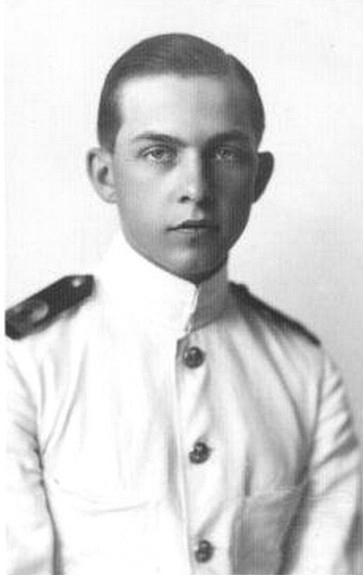
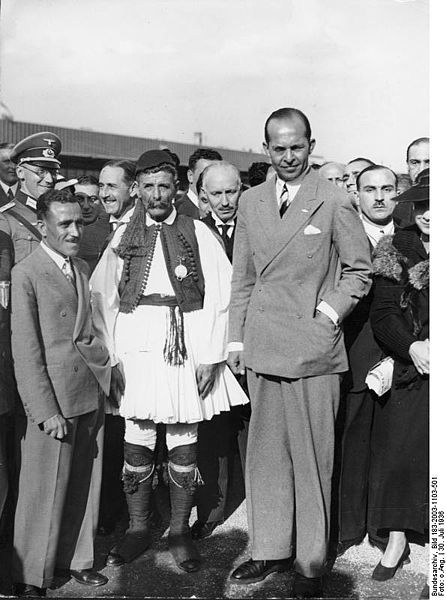
Paul (Greek: Παῦλος, Βασιλεὺς τῶν Ἑλλήνων; 14 December 1901 – 6 March 1964) reigned as King of Greece from 1947 to 1964.
Paul was born in Athens, the third son of King Constantine I of Greece and his wife, Princess Sophia of Prussia. He was trained as a naval officer.
On 9 January 1938, Paul married Frederika of Hanover at Athens. They had three children:
- Sophia, Queen of Spain (born 1938)
- Constantine II, King of the Hellenes (born 1940)
- Irene, Princess of Greece and Denmark (born 1942)
Before his marriage he is alleged to have invited the homosexual literary muse, Denham Fouts, on a cruise of the Aegean Sea, perhaps because they were lovers. However, Fouts's friend John B. L. Goodwin said Fouts often made up stories about his life, and literary critic Katherine Bucknell thought many of the tales about him were myth.
From 1917 to 1920, Paul lived in exile with his father, Constantine
I. From 1923 to 1935, and again from 1941 to 1946, he lived in exile
again, this time with his brother, George II. During most of World War II, when Greece was under German occupation, he was with the Greek government - in - exile in London and Cairo. From Cairo, he broadcast messages to the Greek people.
Paul returned to Greece in 1946. He succeeded to the throne in 1947, on the death of his childless elder brother, King George II, during the Greek Civil War (between Greek Communists and the non - communist Greek government). In 1947 he was unable to attend the wedding of his first cousin, Prince Philip, Duke of Edinburgh, to the future Queen Elizabeth II of the United Kingdom as he was suffering from typhoid fever.
By 1949 the Civil War was effectively over, with the Communist insurgents ceasing the majority of their operations, and the task of rebuilding the shattered north of the country began.
In the 1950s Greece recovered economically, and diplomatic and trade links were strengthened by Paul’s state visits abroad. He became the first Greek Monarch to visit a Turkish Head of State. However, links with Britain became strained over Cyprus, where the majority Greek population favored union with Greece, which Britain, as the colonial power, would not endorse. Eventually, Cyprus became an independent state in 1960.
In December 1959 Prince Maximillian of Bavaria presented the coronation regalia of King Otto of Greece to the King. It had been almost a century since they were last in Greece.
Meanwhile, republican sentiment was growing in Greece. Both Paul and Frederika attracted criticism for their interference in politics, frequent foreign travels, and the cost of maintaining the Royal Family. Paul responded by economizing and donated his private estate at Polidendri to the State.
In 1959, he had an operation for a cataract, and in 1963 an emergency
operation for appendicitis. In late February 1964, he underwent a
further operation for stomach cancer, and died about a week later in
Athens.
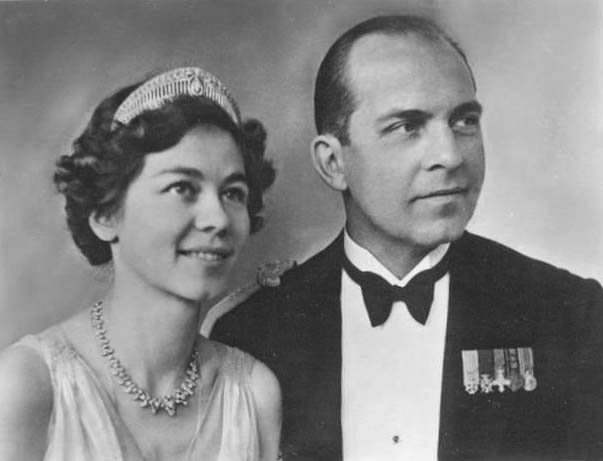
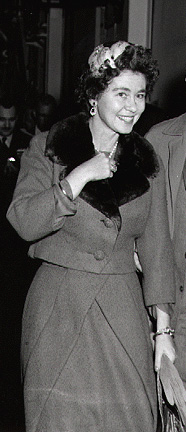
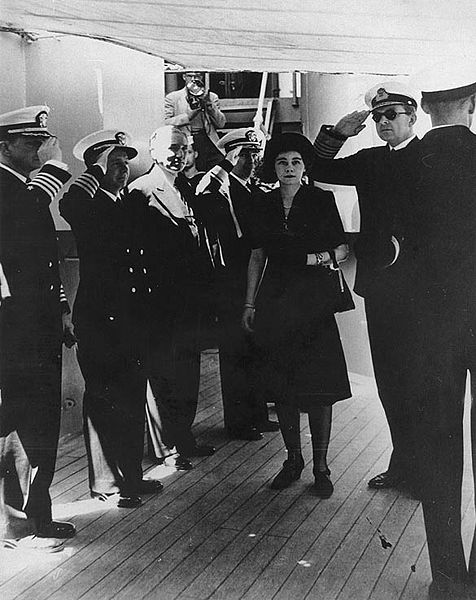
Frederica of Hanover (Frederica Louise Thyra Victoria Margaret Sophie Olga Cecily Isabelle Christina; Greek: Φρειδερίκη; 18 April 1917 – 6 February 1981) was Queen consort of the Hellenes as the wife of King Paul of Greece.
Frederica was born on 18 April 1917 in Blankenburg am Harz, Kingdom of Prussia, German Empire. She was the daughter of Ernest Augustus III, Duke of Brunswick and Princess Viktoria Luise of Prussia, the only daughter of German Emperor William II and Augusta Viktoria of Schleswig - Holstein. As daughter of a Hanoverian Prince, she was Princess Frederica of Hanover, Great Britain and Ireland, and also Duchess Frederica of Brunswick - Lüneburg.
Through her maternal grandfather, Frederica was a great - granddaughter of German Emperor Frederick III and Victoria, Princess Royal, eldest daughter of Queen Victoria and Prince Albert.
Through this relationship, Frederica was a distant cousin of the United Kingdom's Elizabeth II and also of Prince Philip, Duke of Edinburgh. As a descendant of George III of the United Kingdom, she was, at birth, 34th in the line of succession to the British throne, although she had no British rank or title.
HRH Prince Paul, Crown Prince of Greece, proposed to her during the summer of 1936, while he was in Berlin attending the 1936 Summer Olympics. Prince Paul was the son of King Constantine I of Greece and Sophie of Prussia, sister of Wilhelm II of Germany (through whom he was a great - grandson of Queen Victoria and a first cousin once removed to Frederica). Their engagement was announced officially on 28 September 1937. They married in Athens on 9 January 1938. In addition to her standard title of Princess, Frederica used the title Hereditary Princess (Greek: Πριγκήπισσα Διαδόχου, literally "Princess of the Heir"), her husband being heir presumptive to his childless elder brother, King George II of the Hellenes.
During the early part of their marriage, they resided at Villa Psychiko in the suburbs of Athens. Ten months after their marriage, their first child, Princess Sophia (the future Queen Sofia of Spain), was born on 2 November 1938. On 2 June 1940, their son and heir, Crown Prince Constantine (the future King Constantine II), was born.
At the peak of World War II, in April, 1941 the Greek Royal Family evacuated to Crete in a Sunderland flying boat. Shortly afterwards, the German forces attacked Crete. Frederica and her family were evacuated again, setting up a government - in - exile office in London.
In exile, King George II and the rest of the Greek Royal Family settled in South Africa. Here Frederica's last child, Princess Irene, was born on 11 May 1942. The South African leader, General Jan Smuts, served as her godfather. The family eventually settled in Egypt in February 1944.
On 1 September 1946 the Greek people decided by referendum to restore King George to the throne. The Hereditary Prince and Princess returned to their villa in Psychiko.
On 1 April 1947, George II died and Frederica's husband ascended the throne as Paul I, with Frederica as his queen consort. Communist political instability in Northern Greece led to the Greek Civil War. The King and Queen toured Northern Greece under severe security to try to appeal for loyalty in the summer of 1947.
During the civil war, Queen Frederica set the Queen's Camps or Child cities (translation of: Παιδο(υ)πόλεις / Paidoupoleis) a network of 53 Camps around Greece where she would gather mostly orphans and children of poor families. These camps provided much needed shelter, food and education to these children who were aged 3 years to adolescence.
The role of these Queen's Camps is disputed as a means of propaganda by the monarchy through the educational program. The Queen's Camps were a way to fend for the children - victims of the civil war. There were allegations, generally by opposition or communist sources, which held that children were illegally adopted by American families while they were in the Paidoupoleis.
The Greek Civil War ended in August, 1949. The Sovereigns took this opportunity to strengthen the monarchy, they paid official visits to Marshal Josip Broz Tito in Belgrade, Presidents Luigi Einaudi of Italy in Rome, Theodor Heuss of West Germany, and Bechara El Khoury of Lebanon, Emperor Haile Selassie I of Ethiopia, Chakravarthi Rajagopalachari of India, King George VI of the United Kingdom, and the United States as guests of President Dwight D. Eisenhower. However, at home in Greece and abroad in the United Kingdom, Queen Frederica was targeted by the opposition, because as a girl she had belonged to the Bund Deutscher Mädel (League of German Girls), a branch of the Hitler Youth group for young women; her supporters argued that evading membership in the group would be difficult under the existing political climate in Nazi Germany at the time.
Her 16 November 1953 appearance in Life as America's guest was taken on one of the many state visits she paid around the world. Also that year she appeared on the cover of Time. On 14 May 1962 her eldest daughter Sofia married Prince Juan Carlos of Spain, (later King Juan Carlos I of Spain) in Athens.
Frederika has been described as "inherently undemocratic". She was notorious for her numerous arbitrary and unconstitutional interventions in Greek politics and clashes with democratically elected governments. She actively politicked against the election of Alexander Papagos. At home in Greece and abroad in the United Kingdom, she was targeted by the opposition. In 1963 while visiting London rioting forced her to temporary seek refuge in a stranger's house. Her interference in politics was harshly criticized and possibly the most significant factor in the strengthening of republican sentiments.
On 6 March 1964, King Paul died of cancer, and her son ascended the throne as Constantine II. Frederica assumed the title of queen dowager but continued to serve in the role of Queen. When her son Constantine II married Princess Anne - Marie of Denmark later that year on 18 September, Queen Frederica stepped back from the
majority of her public Royal duties in favor of the new Queen. She
remained a figure of controversy and was accused in the press of being
the éminence grise
behind the throne. In response she renounced her apanage and retired to
the countryside where she lived an almost reclusive life. However, she
continued to attend Royal events that were family oriented, such as the
baptisms of her grandchildren in both Spain and Greece.
King Constantine's clashes with the democratically elected Prime Minister Georgios Papandreou were blamed by critics for causing the destabilization that led to a military coup on 21 April 1967 and the rise of the regime of the colonels. Faced with a difficult situation, King Constantine initially collaborated with the military dictatorship, swearing in their government under a royalist prime minister. Later that year he attempted a counter - coup in an attempt to restore democracy, whose failure forced him into exile. Following this, the junta appointed a Regent to carry out the tasks of the exiled Monarch.
On 1 June 1973 the junta abolished the Greek Monarchy without the consent of the Greek people and then attempted to legitimize its actions through a 1973 plebiscite that was widely suspected of being rigged. The new head of state became President of Greece George Papadopoulos.
The dictatorship ended on 24 July 1974 and the pre-junta
constitutional monarchy was never restored. A plebiscite was held in
which King Constantine (who was able to campaign only from outside the
country) freely admitted his past errors, promised to support democracy,
and in particular, promised to keep his mother Queen Frederica away
from Greece and out of Greek politics. 70% of Greeks voted to make
Greece a democratic republic.
Queen Frederica died on 6 February 1981 in exile in Madrid during ophthalmic surgery. In its obituary of the Queen, The New York Times reported that she died during "eyelid surgery," which led to frequent but unsubstantiated rumors that she died while undergoing cosmetic surgery. Other sources state that her cause of death was a heart attack while undergoing the removal of cataracts.
She was interred at Tatoi (the Royal family's palace and burial ground in Greece). Her son and his family were allowed to attend the service but had to leave immediately afterwards.